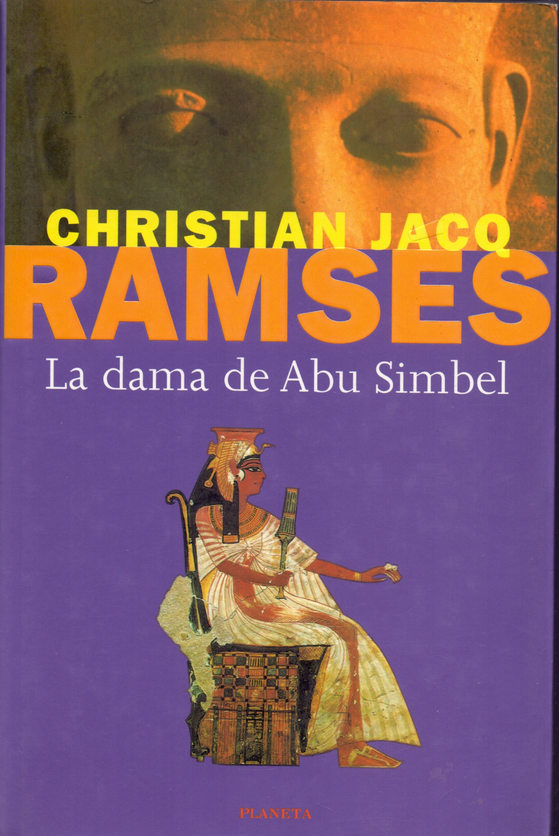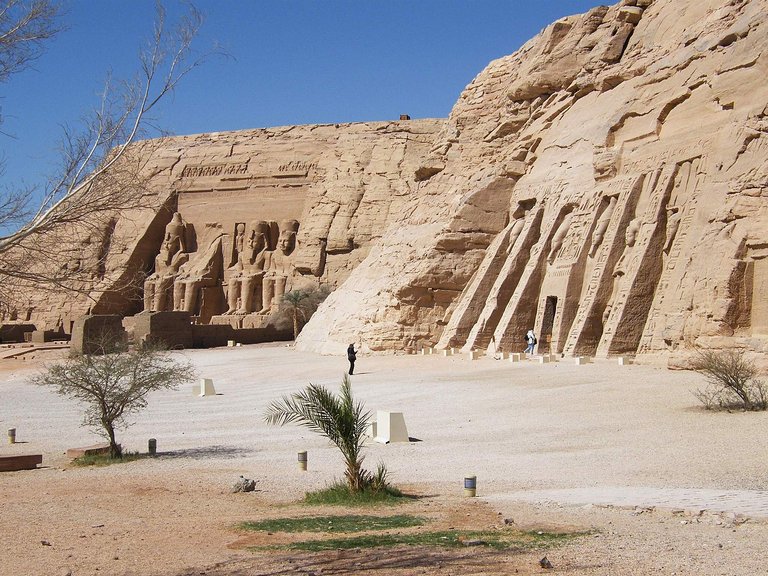
En el post anterior en esta comunidad de Hive Book Club les había hablado sumariamente sobre la construcción del templo que el gran faraón Ramsés había hecho construir en homenaje a su esposa Befertari a orillas del Nilo en la confluencia con la Nubia (actual Sudán) último protectorado egipcio en dirección al sur consderado en esa época tierras salvajes y desconocidas.
Considerando la importancia de la esposa real en el reinado del gran monarca, éste estaba plenamente convencido que reforzando el ka de su esposa y uniéndolo al suyo podían derrotar las fuerzas de las tinieblas encarnadas por el mago Ofir y las fuerzas ya más terrenales de los hititas que siempre estaban en pie de guerra, a pesar de haber subscripto después de la batalla de Kadesh un tratado de no beligerancia con Egipto.
El complejo arqueológico consta de dos templos monumentales: uno llamado templo mayor dedicado a Ramses y otro llamado templo menor dedicado a su diosa Nefertari y a la diosa Heathor

In the previous post in this community of Hive Book Club I had spoken briefly about the construction of the temple that the great pharaoh Ramses had built in honor of his wife Nefertari on the banks of the Nile, precisely in Abu Simbel, at the confluence with Nubia (now Sudan) last Egyptian protectorate to the south considered at that time wild and unknown lands.
Considering the importance of the royal wife in the reign of the great monarch, he was fully convinced that by strengthening the ka of his wife and uniting it to his own they could defeat the forces of darkness embodied by the magician Ophir and the more earthly forces of the Hittites who were always on the warpath, despite having signed after the battle of Kadesh a treaty of non-belligerence with Egypt.
On the other hand, the temple was also intended to reinforce their cult and to commemorate what the Egyptians considered a victory in the battle of Kadesh.
The archaeological complex consists of two monumental temples: one called the major temple dedicated to Ramses and the other called the minor temple dedicated to his goddess Nefertari and the goddess Heathor.


En este penúltimo volumen Christian Jacq narra las últimas etapas de la guerra contra el imperio hitita que, muerto Muwatalli, se disputaban encarnizadamente su hermano Hattusil y su hijo Uri Teshup, diplomático uno, guerrer el otro.
Hattusil predica la paz entre ambos imperios mientras Uri Teshu solo quiere la guerra. Se desecandena una verdadera lucha de poder dentro del Hatti que le permite a Ramsés ir ganando tiempo y a ambas esposas reales, Puduhepa por parte de los hititas y Nefertari representando al Egipto de los faraones, tratar de resanar las heridas y cicatrices causadas por la guerra buscando una paz definitiva.
Moisés se rebela a la autoridad del faraón acusándolo de blasfemo por adorar a varios dioses en vez de uno solo(Yavhè) y a pesar de haber sido perdonado por el monarca por el homicidio del capataz, cuñado del propio Ramses y esposo de la hermana Dolente, (en defensa propia) que maltrataba a los operarios hebreos, rompe la amistad de una vida con el faraón y seguido por la mayor parte de los hebreos inicia el éxodo controlado a distancia por el ejército del faraón que no se anima a interceptarlos.
Beneficiado por las bajas mareas Moisés logra distanciarse y escapar de sus seguidores que cuando deciden interceptarlo se encuentran al alba del dia siguiente con la marea alta.
De aquí nace el relato bíblico de las aguas que se abren su paso.
Asha sigue ocupándose de la diplomacia con el imperio hitita que en ese momento significaba un con tinuo ir y venir entre el Hatti y Egipto (Ramsés ha había hecho construir Pi-Ramses en el delta del Nilo) para evitar un posible ataque sorpresa del enemifo, como ya había ocurrido en el pasado.
Una vez más Asha es capturado como enemigo que lo tiene como rehén para negociar. En realidad las negociaciones se limitan sobre la soberanía de los protectirados de Amurru y Gaza, en proximidades de la actual Israel. En ese momento estaban en manos de tribus beduinas y los llamados "corredores de las arenas" que eran bandas nómades armadas que no respondían a ningún imperio en particular. Solo pensaban en depredar las caravanas que pasaban por esos lugares (no siempre custodiadas por el ejército egipcio) y enriquecerse con el botín.
Homero, el poeta griego, que se ha refugiado definitivamente en Egipto enamorado de la paz, la prosperidad, de su cocina y del aceite de oliva continúa escribiendo La Iliada.
Finalmente la paz definitiva entre Hatti y Egipto lleva. Pero Ramses debeá soportar todavía dos dolores tremendos. Primero la muerte de su madre Tuya y luego la muerte de Nefertari, su esposa.
Nefertari enferma gravemente a causa de un maleficio del mago Ofir y cuando Ramsés la lleva a inaugurar los templos del Ramesseum en Abu Simbel muere después de haber visto la monumental obra completada.

In this penultimate volume Christian Jacq narrates the last stages of the war against the Hittite empire which, after Muwatalli's death, was fiercely disputed by his brother Hattusil and his son Uri Teshup, one a diplomat and the other a warrior.
Hattusil preaches peace between the two empires while Uri Teshu only wants war. A real power struggle breaks out within the Hatti that allows Ramses to gain time and both royal wives, Puduhepa on behalf of the Hittites and Nefertari representing the Egypt of the pharaohs, to try to heal the wounds and scars caused by the war by seeking a definitive peace.
Moses rebels against the authority of the Pharaoh accusing him of blasphemy for worshiping several gods instead of one (Yahweh) and despite having been pardoned by the monarch for the murder of the foreman, brother-in-law of Ramses himself and husband of the sister Dolente, (in self-defense) who mistreated the Hebrew workers, breaks the friendship of a lifetime with the Pharaoh and followed by most of the Hebrews begins the exodus controlled from a distance by the army of the Pharaoh who does not dare to intercept them.
Benefited by the low tides Moses manages to distance himself and escape from his followers who, when they decide to intercept him, find themselves at dawn the next day at high tide.
This is the origin of the biblical story of the waters that open their way.
Asha continues to deal with diplomacy with the Hittite empire which at that time meant a continuous back and forth between Hatti and Egypt (Ramses had had Pi-Ramses built in the Nile delta) to avoid a possible surprise attack by the enemy, as had happened in the past.
Once again Asha is captured as an enemy who holds him hostage to negotiate. In reality the negotiations are limited to the sovereignty of the protectiates of Amurru and Gaza, in the vicinity of present-day Israel. At that time they were in the hands of Bedouin tribes and the so-called "runners of the sands" who were armed nomadic bands that did not answer to any particular empire. They only thought of preying on the caravans that passed through those places (not always guarded by the Egyptian army) and enriching themselves with the booty.
Homer, the Greek poet, who has definitively taken refuge in Egypt in love with peace, prosperity, its cuisine and olive oil, continues to write The Iliad.
Finally the definitive peace between Hatti and Egypt takes. But Ramses must still endure two tremendous pains. First the death of his mother Tuya and then the death of Nefertari, his wife.
Nefertari becomes seriously ill because of a spell of the magician Ophir and when Ramses takes her to inaugurate the temples of the Ramesseum in Abu Simbel dies after seeing the monumental work completed.

Una vez más Christian Jacq nos sorprende contándonos misterios jamás develados y luchas de poder en el imperio más grande de la antiguedad: El Antiguo Egipto de Ramsés que logra unificar lo que hasta ese momento era un imperio dividido en dos: el Alto y el Bajo Egipto.
El modo de contar las historias mezclando realidad y ficción, basándose en datos, fechas y nombres de personajes realmente existidos con la ficción de una mitología totalmente desconocida en el mundo occidental, resaltan la fascinación de estos relatos y contribuyen -leyendo los libros- a aumentar nuestros escasos conocimientos de una cultura milenaria que no tuvo pares en su tiempo.

Once again Christian Jacq surprises us by telling us mysteries never revealed and power struggles in the largest empire of antiquity: The Ancient Egypt of Ramses, which manages to unify what until then was an empire divided in two: Upper and Lower Egypt.
The way the stories are told, mixing fact and fiction, based on data, dates and names of characters that really existed with the fiction of a mythology totally unknown in the Western world, highlight the fascination of these stories and contribute - by reading the books - to increase our scarce knowledge of a millenary culture that had no peers in its time.
Traducción efectuada con / Translation made with DeepL Translator

Congratulations @greengalletti! You have completed the following achievement on the Hive blockchain and have been rewarded with new badge(s):
You can view your badges on your board and compare yourself to others in the Ranking
If you no longer want to receive notifications, reply to this comment with the word
STOP